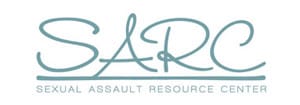At SARC, we believe that education is a key part of preventing sexual violence and creating safer, healthier communities. Our Education & Training programs raise awareness about the dynamics of sexual violence, increase access to support services, and strengthen the community’s ability to respond in ways that are supportive and survivor-centered.
We offer a range of educational opportunities and can tailor presentations or trainings to meet the needs of each group we serve.
Training for Professionals
Professionals across many fields may find it difficult to know how to respond when someone discloses trauma. These moments matter: research shows that a negative response can worsen outcomes for survivors. SARC offers specialized training to help professionals respond with empathy and confidence, while also balancing professional responsibilities such as mandatory reporting. We also work with agencies to build trauma-informed policies and practices that reduce institutional harm.
Tabling & Community Events
SARC is available to attend community events to share information about our services, prevention strategies, and ways to get involved. At these events, our staff and volunteers provide materials, answer questions, and start conversations that help build a stronger, safer community.
Survivor Educational Groups
In addition to peer support groups, SARC periodically offers educational workshops for survivors. These groups focus on specific topics—such as healthy relationships, sexuality, or boundaries—and provide a supportive space for deeper learning and connection. Unlike support groups, these sessions are structured as a series, giving participants the chance to move through the material together as a group. Updates about these opportunities will be shared on our website and social media.
Classroom & Group Presentations
SARC’s educators facilitate interactive and age-appropriate sessions on topics such as consent, boundaries, healthy relationships, and the dynamics of sexual violence. We adapt each presentation to the unique needs of the group, whether that’s a high school classroom, youth leadership group, college course, or community organization. Our goal is to create meaningful dialogue and practical learning that empowers participants to prevent and respond to sexual violence.
Frequently Asked Questions
Who can request a training or presentation?
Anyone! Survivor groups, schools, community organizations, service providers, and businesses are all welcome to request education and training through SARC.
Are these services free?
Our programs are always free for survivors, and we strive to make education and training accessible to community and educational partners, and businesses, regardless of their ability to pay. Check out our rates below, or contact us for further information.
Request a Training or Presentation
If you are interested in scheduling a training, classroom presentation, or inviting SARC to your event, please contact kirstenl@sarcoregon.org.
RATES & AVAILABLE TRAININGS
RATES
Costs and staffing requirements may vary. Please contact us to discuss your budget!
- Colleges, Businesses, Medical Providers and Government agencies: $125 per hour. Hourly fee applies to training preparation, facilitation time, and number of staff needed for workshop(s).
- Culturally Specific non-profits and community partners: Contact us to discuss rates.
COMMUNITY TRAININGS
LIST OF AVAILABLE TRAININGS
- SARC overview and abridged SA 101- FREE (preferred 1 ½, can do in one hour)
- Sexual Violence 101: History and root causes
- Sexual Violence 102: Tactics, dynamics, and impact
- Vicarious Trauma, Self Care, and Creating Containers for Conversation
- Healthy Dating 101
- Teen Dating Violence
- Supporting Survivors
- Trauma Informed Cared with Survivors of Sexual Violence
SPECIALIZED TRAINING & CONSULTATION
SARC can consult and create specialized trainings for topics or challenges that your organization/business/community is facing.
Please reach out to our Education & Training Program Manager for more information kirstenl@sarcoregon.org
CUSTOMIZED TRAININGS PREVIOUSLY GIVEN
- Sharing Survivors’ Stories: Avoiding Sensationalism Without Compromising Impact
- Media Literacy and Sexual Violence
- Hookup Culture
The field of violence prevention, and sexual violence specifically, is constantly evolving and growing. It is informed by survivors’ expertise, advocate experience, community needs, known best practices, social movements, and the larger present culture. SARC trainers have a learner’s mindset while simultaneously bringing informed perspectives, practiced expertise, and unique knowledge to the work. Trainers will facilitate a space where participants gain knowledge and skills while also creating conversations for the unique challenges each community faces.
PROGRAM PHILOSOPHIES
The field of public health prevention is defined through three levels of intervention in a health problem. Based on when the intervention is used in targeting prevention of problem, they are:
- Primary Prevention: Approaches that are employed before any sexual violence has occurred to prevent initial perpetration and victimization.
- Secondary Prevention: An immediate response after sexual violence has been perpetrated.
- Tertiary Prevention: A long-term response after sexual violence perpetration.
SARC focuses on primary prevention in our education efforts. Secondary and tertiary prevention are taught at various points during the educational sessions and are not the primary focus. The programs aim to address attitudes, behaviors and beliefs regarding sexual violence in an effort to influence behavior and prevent perpetration from ever happening.
Effective prevention strategies are comprehensive—addressing the multiple levels of influence for sexual violence victimization and perpetration utilizing the social ecological model. SARC’s work considers risk and protective factors for the perpetration of sexual violence across the various levels of the ecological model.
These levels include characteristics of individuals, their relationships, the community and the society.
Examples of these strategies, at the various levels, are:
INDIVIDUAL
Teaching individuals what healthy sexuality & relationships look like and establishing norms around mutuality & respect.
RELATIONSHIP
Providing education on how to create supportive & trauma informed environments.
COMMUNITY
Forming larger groups of important community members & stakeholders that can promote general health & wellbeing in our community.
SOCIETAL
Working with institutions to influence policy & media changes that eradicate all forms of social injustice.
PREVENTION RESOURCES
For more information on our program please contact sarc@sarcoregon.org
Check out the links below for organizations, videos, and other resources that address sexual violence prevention topics.
Podcasts That Raise Awareness On Sexual Violence and Challenge Harmful Norms
Featured in the Podcast:
Brooke Welter (she/her):
Community Education and Prevention Specialist at the Sexual Assault Resource Center-Oregon
Email: brookew@sarcoregon.org
Laurel Clohessy (she/her):
Youth Services Program Manager at Clackamas Women’s Services
Email: laurelc@cwsor.org
Arlo Rudy (he/him):
Youth Services Coordinator at Clackamas Women’s Services
Email: arlor@cwsor.org



